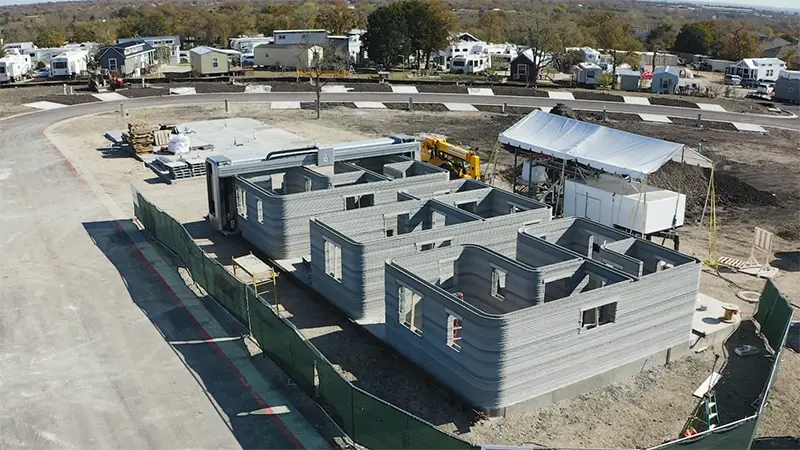While the construction industry has been slower to adopt automation and digitalization, it has increasingly converged with the technologically-advanced manufacturing sector for the production of constituent components for buildings. As construction makes use of more prefabricated materials and pre-assembled parts for housing and other developments, it benefits from the advanced technology used in manufacturing to increase capability in production. From shorter lead times with online manufacturing services to the speedy creation of 3D printed components, automated processes improve all stages of production. The use of quickly produced and assembled constituent parts leads in turn to greater efficiency on construction sites, where builds can be completed faster.
Automated Production Processes For Modular Homes
As the need for affordable housing grows, the lower costs and faster completion times of modular homes has led to it growing in popularity around the world. Separate repeated housing modules are produced on assembly lines away from the building plot, before each element is wrapped and delivered to its destination. Here, they are put together on site following local and state building codes. By manufacturing components off-site, the time taken to complete the basic frame of a house can be reduced by 75%. Modular housing is different to manufactured housing as it can be created in a range of styles, meeting the particular needs of individual homeowners. Greater automation during the manufacture and assembly of each module also speeds up the whole process of creating a modular home. From the use of software solutions for conveyor systems to automated packaging before shipping to site, the production time of each module is improved without compromising on its quality.
AI Applications in Construction Manufacturing
Automated manufacturing systems are further enhanced with AI, especially for individual construction projects on smart manufacturing systems which require the regular reconfiguration of factory production lines. Robotics are already being used in the production of modular and prefabricated building structures, as automated tools can perform tasks more precisely. With additional supervised machine learning, the benefits of their use could be expanded further. While the construction industry can benefit directly from the use of the advanced technology in AI through improved planning, monitoring and safety control, the ability to quickly and efficiently build housing modules in factories means that the sector also benefits from greater automation in the manufacturing industry. Building away from site takes away the risks of labor shortages, adverse weather conditions, and other uncertainties, and results in quicker and safer builds overall.
3D Printing for Building Structures
Robotics are also used in one of the most exciting technological advances in manufacturing and construction, the creation of 3D printed homes and other buildings. The technology can be used to create complex designs of large and multi storey buildings from layers of polymer, metal and concrete, with a robotic arm commonly used to extrude the latter. As well as resulting in less waste and lower costs than a traditional build of bricks and mortar, 3D printing also offers faster construction. While 3D printers only create the foundations and walls of a building, without the practical constraints of a building site whole homes can be printed in just days. As the technology is perfected, this time could be reduced further in the future.
As more construction relies on manufactured components, the advanced technology used in production results in speedier builds. Faster and more efficient production lines, 3D printing and the use of AI all enhance the manufacture of buildings, from creating separate modular elements to whole buildings. As well as simplifying production processes for manufacturers, the resulting products which are quickly assembled and implemented into developments also benefit the construction industry.
